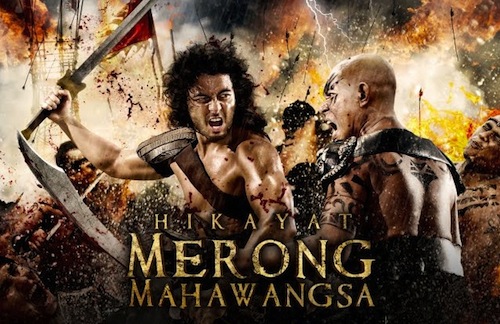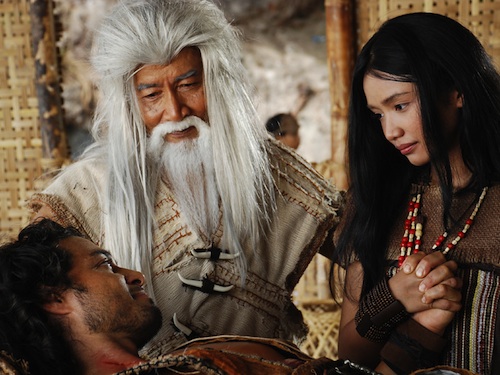

The studio that gave you "Cicakman" presents a multi-million Ringgit fantasy blockbuster in the best traditions of Hollywood. But does it measure up?
If imitation is the sincerest form of flattery, then "Hikayat Merong Mahawangsa" will really get Hollywood blushing.
That is if the film ever manages to find an audience beyond these shores. For all its pretensions to being a film by, for and about Malaysians, it is very much geared towards a more "Western" sensibility. It even has a different title for the international market: "The Malay Chronicles: Bloodlines". The irony is that in trying to mimic the syles and mindsets of Western cinema, it has lost whatever unique sense of identity that might’ve made it appealing to the Mat Sallehs.
And this is the biggest problem with Malaysian cinema in general. The lack of a singular, original voice. Perhaps our nation’s pluralism has something to do with it. Perhaps that’s just an excuse. After all, a few local filmmakers like the late Yasmin Ahmad managed to turn our diversity into a selling point, allowing their films to resonate even with foreigners. Ahmad’s films, like "Sepet" and "Gubra" celebrated true Malaysiana, warts and all. In being single-minded about the differences that make us what we are, her films felt honest. And honesty is a universally appreciable trait.
Of course, an art-house drama is a very different exercise compared to a mainstream action-fantasy blockbuster. But at heart, the same values apply. "Hikayat Merong Mahawangsa" is a reasonably well-made film, filled with moments of genuine entertainment, but at heart, it lacks a feeling of honesty. Throughout the entire running time, there are very few moments that feel like it’s a story about a Malaysian legend that is being told by Malaysian filmmakers. From the anachronistic character attitudes that are cribbed straight out of the Disney heroine textbook, to the costume designs that are more appropriate for Hollywood’s Swords & Sandals epics, to ethnic characters who speak in perfect English when they have no rightful reason to do so, to the quasi-inspirational speechifying lifted from a thousand war flicks, you’d be hard-pressed to find something that feels like it belongs here.
A shame, since the legend of Merong Mahawangsa is rich and compelling enough without the need for surface embellishments. For those of you unfamiliar with this figure from Malaysian folklore, he was supposedly a descendent of Alexander The Great, a formidable warrior who was instrumental in the founding of Kedah (then known as the kingdom of Langkasuka). Interestingly enough, the Merong Mahawangsa of history was a devout Buddhist, so take the movie’s depiction of him as a bloodletting scoundrel with a pinch of salt. In fact, the filmmakers take a great number of liberties with history, in the name of entertainment. No big deal, since this isn’t meant to be a documentary or even a biography. Playing fast and loose with our historical figures can actually make them more vivid and immediate.
Which is precisely what scriptwriters Yusry Abdul Halim and Amir Hafizi have done. To their credit, they have revived a name that most Malaysians (myself included) were only aware of on the most rudimentary level. Which says a lot about how history is taught in our schools. But I digress. In this tale, they’ve made Merong an educated savage in the manner of Mel Gibson’s legendary Scottish freedom fighter William Wallace ("Braveheart").
It works for the purposes of this story, since here he needs to be the rough & tumble sort, while eventually discovering his destiny as a king. The thing is, this isn’t his story alone. Probably out of some directive to invoke the Malaysian spirit of "muhibbah", the scope becomes global. Apparently, the Roman Empire of the 2nd Century AD saw fit to grow ties with the Chinese Empire. To accomplish that, they arranged for their prince, Marcus Carprenius to wed a Chinese princess, Meng Lihua. By chance, Merong gets roped in to escort the prince to the Malay peninsula, where the contingent from China awaits. Naturally, things don’t go according to plan. A fearsome tribe of pirates with supernatural powers enters the fray, and shit hits the fan. So far so fictitious, but if it makes for a good yarn, I’m all for it.
The problem is the way the yarn unravels. I do realise the need to paint in relatively broad strokes when playing to a mainstream audience: heroes and villains are uncomplicated people, with motivations in black & white, while the plot follows a linear path. Unfortunately, everything is SO broad and obvious in this film, they verge on parody. It certainly doesn’t help that this film falls prey to another ugly trait of local cinema— acute melodrama. Lines are declared with full bombast where they should just be spoken. Character intentions are broadcasted, in your face, where simple hints would suffice.
This lack of subtlety is what generally separates Southeast Asian cinema from our more advanced cousins in the Asia-Pacific region. A friend of mine argued that the audience mindset here is different compared to say, Japan or Australia. And I agree. The reason it’s like this is because we’re in a self-perpetuating loop. Filmmakers here are convinced that audiences cannot accept anything more sophisticated, so they keep giving us stuff that feeds the existing mentality. And the cycle continues…
Then add to the equation the barefaced aping I raised earlier. Copying is no great crime if you do it well, and understand how it should be done so that the result is something you can call your own. Some of the best directors are notorious magpies: Quentin Tarantino regularly rips off little-known B-movies, and turns them into refreshingly hip, modern takes. James Cameron’s "Avatar" was basically "Dances With Wolves" meets "Ferngully". But he added his geek-obsession with deep-sea marine life and his trademark techno-centricity to the mix and the film became something no one had ever seen before.
With "Hikayat Merong Mahawangsa" there is the distinct impression that you’ve seen it all before, and done much better elsewhere. Director Yusry Halim has an eye for what’s cool, but he lacks an understanding of context. Just because you can ape something, doesn’t mean you should. Case in point: the jittery, stop-motion style frame-rate for the climactic battle scenes. Treatments like these worked in films like Neil Burger’s "The Illusionist" because they aided the storytelling, and informed the audience of a character’s psychological state. Here, there’s no reason for it, other than saying "Hey, I think it looks kinda cool." Even worse, these techniques just draw unnecessary attention to themselves, and get in the way of the action or the dialogue.

In spite of all these impediments, most of the cast acquit themselves fairly well. Stephen Rahman-Hughes has the heaviest burden to shoulder. He has the thankless task of being the hero in a film that seems determined to make its hero look and sound silly. For the confrontational scenes, he isn’t able to overcome the directorial misstep of being made to deliver his lines like he’s a used-car salesman. Being saddled with a cheesy screenplay only accentuates this. It is only during the film’s quieter moments that Rahman-Hughes’ natural screen presence comes through, unfettered from the directive to try so hard. Good actors should never be over-directed, or they’ll just end up giving you a performance on par with the worst actors. British import Gavin Stenhouse also makes the best of a limited role. He has an easygoing charm that makes his Prince Marcus a guy to root for.
The film’s best performance however, belongs to veteran actor Dato’ Rahim Razali. Although buried under comedy Gandalf wig and beard, he brings a strong, calm dignity to his role as Pak Kesum, the wise old sage who guides Merong on his path to becoming a leader of men. Razali’s presence lends the film a much-needed air of gravity and believability.
I have to say that it is extremely difficult to do a period-set action-fantasy epic that actually comes across as epic. While the production values of "Hikayat Merong Mahawangsa" aren’t quite up to Western standards, it is still a pretty commendable effort by any measure. KRU Studios have managed to give their film the veneer of a production far more lavish than the reported budget of RM8 million. That kind of money can barely even finance the average independent film in America.
Now all they need to do is avoid the "Rojak" (fruit salad) syndrome, by finding a voice that is all their own.
Storyteller by trade and dreamer by nature, Wai has been deeply nuts about the celluloid world since the first time he discovered he could watch a story instead of reading it. But he likes writing about it. Wai goes by a single name because he likes to avoid any "Imperial entanglements" (a.k.a. "conflict of interest with the powers that be" for those of you who don?t speak Star Wars) in his employment. Plus, cool people use one-word names. He has just set up a movie website, the first of its kind in Malaysia, in an effort to foster greater filmic knowledge for the rakyat. Check outElectroshadow.
No comments:
Post a Comment